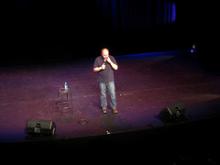Image


While I was talking with him on the phone Thursday night, he checked his Web site and about 175,000 people had bought his special through PayPal. He expected 200,000 total downloads by the weekend, which meant he would have grossed $1 million. After covering costs of about $250,000 for the live production and the Web site, that’s a $750,000 profit. And he owns the rights, and the long tail of buyers, in perpetuity. The transparency of the enterprise, including its cost in relation to how many people bought in, was the subject of media coverage all last week. ... “O.K., so NBC is this huge company and they have all these studios and these satellites to beam stuff out,” he said, “but on the Web, both NBC.com and LouisCK.com have the same amount of bandwidth. We are equals and there are things you can do with that. This has been a fun little experiment.”His "fun little experiment" demonstrates the threat posed by the Internet to the old business models of cable companies and content owners like Viacom and Disney. And this is why Comcast's purchase of NBC is worrisome. Comcast is still fighting for the authority to prioritize some sites over others - it wants to violate the historic principle of network neutrality that prevents a service provider from interfering with what sites a subscriber visits. If Comcast had its way, it would require a taste of the action from Louis CK or could throttle the connections of those users watching his content. In short, this success story illustrates the threat to the cable business model. Cable has long been the gatekeeper to content - Comcast decides what channels I can choose from. But right now on the Internet, I choose what content I can choose from. Community networks, which put the public good above maximizing potential profits, are far less likely to interfere in the way that big companies like AT&T have admitted they would like to. It ultimately comes down to whether one views access to the Internet as just another product in the market or as an infrastruture or platform for everything else. While the FCC should ensure that service providers cannot prioritize some content over similar content (CNN video over Bloomberg video, for instance), communities are smart to establish networks that are locally accountable -- as hundreds of communities already have. Depending on the FCC to police distant corporations is a poor strategy. Photo used under creative commons, courtesy of Moff on Flickr.
